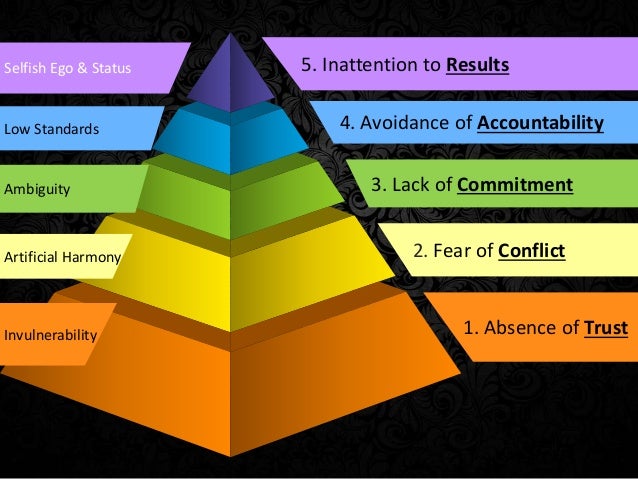

Promoting accountability by setting clear expectations, providing feedback, and holding team members responsible for their actions and decisions.
 Fostering commitment by ensuring that team members understand the team’s goals and objectives and have a clear sense of their roles and responsibilities. Encouraging healthy conflict by promoting constructive criticism, inviting diverse perspectives, and facilitating discussions that allow for disagreement.
Fostering commitment by ensuring that team members understand the team’s goals and objectives and have a clear sense of their roles and responsibilities. Encouraging healthy conflict by promoting constructive criticism, inviting diverse perspectives, and facilitating discussions that allow for disagreement.  Building a culture of trust and openness, where team members feel comfortable sharing their thoughts and ideas. To create high-performing teams, leaders must address these dysfunctions by building trust, encouraging healthy conflict, fostering commitment, promoting accountability, and focusing on results. Inattention to results: A team that is not focused on achieving results can become complacent or disengaged, leading to a lack of motivation and productivity. Avoidance of accountability: When team members don’t hold each other accountable for their actions or decisions, it can lead to a lack of trust, fear of conflict, and lack of commitment. Lack of commitment: Without commitment, team members may not be fully invested in the team’s goals or objectives, and they may not be willing to make sacrifices for the team. Fear of conflict : When team members are afraid of conflict, they tend to avoid difficult conversations, which can lead to a lack of accountability and commitment. Without trust, team members are unlikely to be honest with each other, seek help or share information. Absence of trust: This is the foundation of any team. Over the past quarter, we have explored in detail the role of leadership in identifying and addressing the five team dysfunctions – as framed through Patrick Lencioni’s model – which considers teams according to the following criteria:
Building a culture of trust and openness, where team members feel comfortable sharing their thoughts and ideas. To create high-performing teams, leaders must address these dysfunctions by building trust, encouraging healthy conflict, fostering commitment, promoting accountability, and focusing on results. Inattention to results: A team that is not focused on achieving results can become complacent or disengaged, leading to a lack of motivation and productivity. Avoidance of accountability: When team members don’t hold each other accountable for their actions or decisions, it can lead to a lack of trust, fear of conflict, and lack of commitment. Lack of commitment: Without commitment, team members may not be fully invested in the team’s goals or objectives, and they may not be willing to make sacrifices for the team. Fear of conflict : When team members are afraid of conflict, they tend to avoid difficult conversations, which can lead to a lack of accountability and commitment. Without trust, team members are unlikely to be honest with each other, seek help or share information. Absence of trust: This is the foundation of any team. Over the past quarter, we have explored in detail the role of leadership in identifying and addressing the five team dysfunctions – as framed through Patrick Lencioni’s model – which considers teams according to the following criteria:










